|
|
|
Sort Order |
|
|
|
Items / Page
|
|
|
|
|
|
|
| Srl | Item |
| 1 |
ID:
136493


|
|
|
|
|
| Summary/Abstract |
Russia’s annexation of Crimea and ongoing efforts to de-stabilize Eastern Ukraine have led NATO and the US to adopt a number of initiatives aimed at “reassuring” Eastern and Central European allies. This article assesses the implications of those initiatives for NATO’s evolving position in Eastern Europe. It also appraises the Alliance’s renewed focus on defense and deterrence with respect to European and transatlantic capabilities.
|
|
|
|
|
|
|
|
|
|
|
|
|
|
|
|
| 2 |
ID:
172104
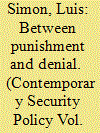

|
|
|
|
|
| Summary/Abstract |
Most debates on U.S. military strategy in the Western Pacific revolve around the question of how to deter China. Advocates of deterrence by punishment believe that the Chinese threat is serious but not critical, because the United States can leverage its global military-technological advantages to preserve a position of regional military primacy. Those in favor of deterrence by denial point to China’s potential and “home advantages,” and argue that the United States should settle for more modest objectives such as preventing Chinese regional military dominance. I argue that the high level of uncertainty around Chinese capabilities and the evolving Sino-American regional military balance have led the United States to adopt a flexible strategy, and embrace distinct–even contradictory–operational concepts to deter Beijing: The United States itself mostly focuses primarily on deterrence by punishment, while actively encouraging and enabling its regional allies to develop deterrence by denial.
|
|
|
|
|
|
|
|
|
|
|
|
|
|
|
|
| 3 |
ID:
141673


|
|
|
|
|
| Summary/Abstract |
Any discussion of a potential ‘Brexit’ should be set against the backdrop of an increasingly convulsive European landscape. The merits and shortcomings of the European Union should be judged not in isolation, but through the lens of their implications upon a broader postwar European order that Britain has helped to build and sustain for nearly seven decades. US strategic retrenchment, Germany's economic and political pre-eminence within the EU, and Russia's attempts to recreate a sphere of influence in Eastern Europe are likely to disrupt the European balance. Luis Simón argues that ‘Brexit’ could exacerbate each of these disruptive trends – with negative ramifications for UK national security. Conversely, he contends, by leveraging its membership of and influence within the EU, Britain could help revitalise the transatlantic relationship, mitigate the spectre of a German-dominated EU, and check Russian revisionism in Eastern Europe.
|
|
|
|
|
|
|
|
|
|
|
|
|
|
|
|
| 4 |
ID:
104764
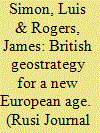

|
|
|
|
|
| Publication |
2011.
|
| Summary/Abstract |
For decades, European security has been assured by a grand, Anglo-American inspired political and economic project on the continent. Today, there is a risk that the old certainties are unravelling. In a previous RUSI Journal article, Luis Simón and James Rogers warned of the new risks in Europe; now, the authors offer a strategy for Britain to retain its vital place at the crux of an open, liberal European system.
|
|
|
|
|
|
|
|
|
|
|
|
|
|
|
|
| 5 |
ID:
114943
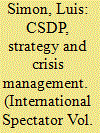

|
|
|
|
|
| Publication |
2012.
|
| Summary/Abstract |
The EU's ineffectiveness vis-à-vis Libya and the southern Mediterranean crises more broadly is largely explained by the CSDP's narrow mandate centred on crisis management. The EU's emphasis on external crisis management was strategically sound given the geopolitical context of the 1990s. CSDP's quiet drift towards a 'softer' kind of crisis management from the middle of the first decade of the 2000s was also instrumental in highlighting the EU's differences from post-11 September US unilateralism. That said, (soft) crisis management has become progressively obsolete in the light of a rapidly changing geopolitical environment characterised by an overall retreat of Western power globally, a weakening of America's commitment to European security, an increasingly tumultuous European neighbourhood, and Europe's financial troubles. In order to meet the demands of a changing geopolitical environment, CSDP must break away from its distinctively reactive approach to security to include all the functions normally associated with the military including, chiefly, deterrence and prevention. This would allow the EU to actively shape its regional and global milieu.
|
|
|
|
|
|
|
|
|
|
|
|
|
|
|
|
| 6 |
ID:
132557


|
|
|
|
|
| Publication |
2014.
|
| Summary/Abstract |
Insofar as Europe's security and cohesion have for decades been premised upon a strong American political and strategic engagement, Washington's intention to "rebalance" to Asia casts a shadow over the sustainability of a stable and coherent geopolitical order on the continent. This article argues that as the United States seeks to rebalance strategically towards the Asia-Pacific region a number of "indigenous" geopolitical trends are becoming increasingly important in Europe: an Anglo-French entente for a "maritime" Europe, a German-French "continental" project of economic and political integration, and Russia's resurgence across Europe's East. The growing prominence of competing geopolitical visions for Europe might even call into question the cohesion and direction of the institutional expressions of the U.S.- engineered Western order in Europe, namely the Atlantic Alliance and the European Union. Increasing geopolitical and institutional contestation, we contend, pose a number of challenges for both U.S. interests and European security.
|
|
|
|
|
|
|
|
|
|
|
|
|
|
|
|
| 7 |
ID:
141279


|
|
|
|
|
| Summary/Abstract |
This article examines how, in a global strategic context presided by the rise of Asia and the US rebalance towards that region, Europeans are contributing to transatlantic burden-sharing—whether individually or through the EU/NATO. As Asian powers reach westward and the US shifts its strategic priorities eastward, classical geostrategic delimitations become gradually tenuous. Particularly important are the ‘middle spaces’ of the Indian Ocean, central Asia and the Arctic, in that they constitute the main avenues of communication between the Asia–Pacific and the European neighbourhood. The article seeks to understand how evolving geostrategic dynamics in Europe, the ‘middle spaces’ and the Asia–Pacific relate to each other, and how they might impinge on discussions on transatlantic burden-sharing. It is argued that the ability of Europeans to contribute to a more equitable transatlantic burden-sharing revolves around two main tenets. First, by engaging in the ‘middle spaces’, Europe's key powers and institutions are helping to underpin a balance of power in these regions. Second, by stepping up their diplomatic and economic role in the Asia–Pacific, strengthening their security ties to (US) regional allies and maintaining an EU-wide arms embargo on China, Europeans are broadly complementing US efforts in that key region. There are a number of factors that stand in the way of a meaningful European engagement in the ‘middle spaces’ and the Asia–Pacific, including divergent security priorities among Europeans, the impact of budgetary austerity on European defence capabilities and a tendency to confine foreign policy to the immediate neighbourhood. The article discusses the implications of those obstacles and outlines some ways in which they might be overcome.
|
|
|
|
|
|
|
|
|
|
|
|
|
|
|
|
| 8 |
ID:
147090


|
|
|
|
|
| Summary/Abstract |
To what extent can we speak of a distinctively ‘European’ security approach towards the Asia-Pacific region? In order to address that timely question, this article examines how Britain, France, Germany and the European Union (EU) are framing their evolving security roles in the Asia-Pacific region, and how those individual perspectives intersect with each other. The article identifies a number of important common features in Europe’s approaches towards security in the Asia-Pacific, namely the tendency of most European actors to emphasize the economic and diplomatic nature of their contribution to regional security, their promotion of regional multilateral security fora, their rejection of the notion that China’s rise is inherently challenging for regional and global security, and their willingness to signal their differences towards Washington’s emphasis on military power and alliance-based approach. However, and despite the existence of common traits, individual European actors show different degrees of closeness vis-à-vis the US and China and feature different perspectives regarding which security relationships they should prioritize in the region (if any), or the appropriate balance between diplomacy and security and defence cooperation. Such divergences prevent Europeans from developing a coherent security profile in the region and preclude us from speaking of a distinctively European security approach towards the Asia-Pacific.
|
|
|
|
|
|
|
|
|
|
|
|
|
|
|
|
| 9 |
ID:
153951
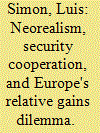

|
|
|
|
|
| Summary/Abstract |
Most neorealists argue that relative decline constitutes a systemic incentive for European security cooperation. Although this claim is broadly accepted, I argue that the relationship between relative decline and European security cooperation is complicated by a number of factors. First, European calculations about relative decline bear both a global and a regional (that is, intra-European) component. If a European country is to effectively mitigate relative decline, cooperation is not sufficient. It is just as important that cooperation develops in a way that underscores that country's comparative strengths and minimizes its weaknesses. In this regard, European countries are often in direct competition with each other. Secondly, when Europeans are thinking about their relative power position, some countries matter more than others: a given European country may accept to incur a relative loss vis-à-vis another country (European or otherwise) but not others. These calculations are further complicated by issue linkage. Some countries may accept relative losses on some issues (for example, security) in exchange for gains on others (economic). This article examines how intra-European considerations of relative gains affect the way in which Europe's main powers seek to cope with relative decline and assesses how those considerations affect security cooperation in a European Union (EU) framework. In doing so, it aims to unpack the otherwise vague notions of relative decline and European security cooperation.
|
|
|
|
|
|
|
|
|
|
|
|
|
|
|
|
| 10 |
ID:
177992
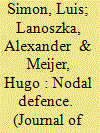

|
|
|
|
|
| Summary/Abstract |
Scholars and pundits alike continue to portray the U.S.-led regional alliance systems in Europe and East Asia in stark, dichotomous terms. Whereas the North Atlantic Treaty Organization is the standard model of multilateralism, the U.S.-led system of bilateral alliances in East Asia is the archetypal ‘hub-and-spokes’ structure in which different allies (the spokes) enjoy deep bilateral strategic ties with Washington (the hub) but not with each other. We argue that these common depictions of U.S.-led alliance systems are obsolete. Instead, we show that what we label ‘nodal defence’ – a hybrid category that combines overlapping bilateral, minilateral and multilateral initiatives – better captures how the U.S.-led alliance systems in Europe and East Asia operate today. Specifically, nodal defence is a hybrid alliance system in which allies are connected through variable geometries of defence cooperation that are organized around specific functional roles so as to tackle different threats. To show how nodal defence is an emerging central feature of the U.S.-led regional alliance systems, we conduct an original cross-regional comparison of how these alliance systems work, drawing on elite interviews, official documents, and secondary literature.
|
|
|
|
|
|
|
|
|
|
|
|
|
|
|
|
| 11 |
ID:
123439


|
|
|
|
|
| Publication |
2013.
|
| Summary/Abstract |
This article calls for an expansion in the study of Asian geopolitics beyond the Indo-Pacific axis. China's geostrategic rise and that of Asia's other main powers are phenomena that bear multiple maritime and continental manifestations. Insofar as Asia's powers meet in different regions, the "primary" Indo-Pacific theater cannot be isolated from developments in Central, South, Southeast, Northeast Asia, the northwestern Pacific, or the Arctic. By conceptualizing seapower and landpower as an interactive dyad in geostrategy and zooming in on the maritime and continental directions of China, India, and Russia, this article depicts Asia as an increasingly interdependent geopolitical whole.
|
|
|
|
|
|
|
|
|
|
|
|
|
|
|
|
| 12 |
ID:
096996


|
|
|
| 13 |
ID:
122265


|
|
|
|
|
|
|
|